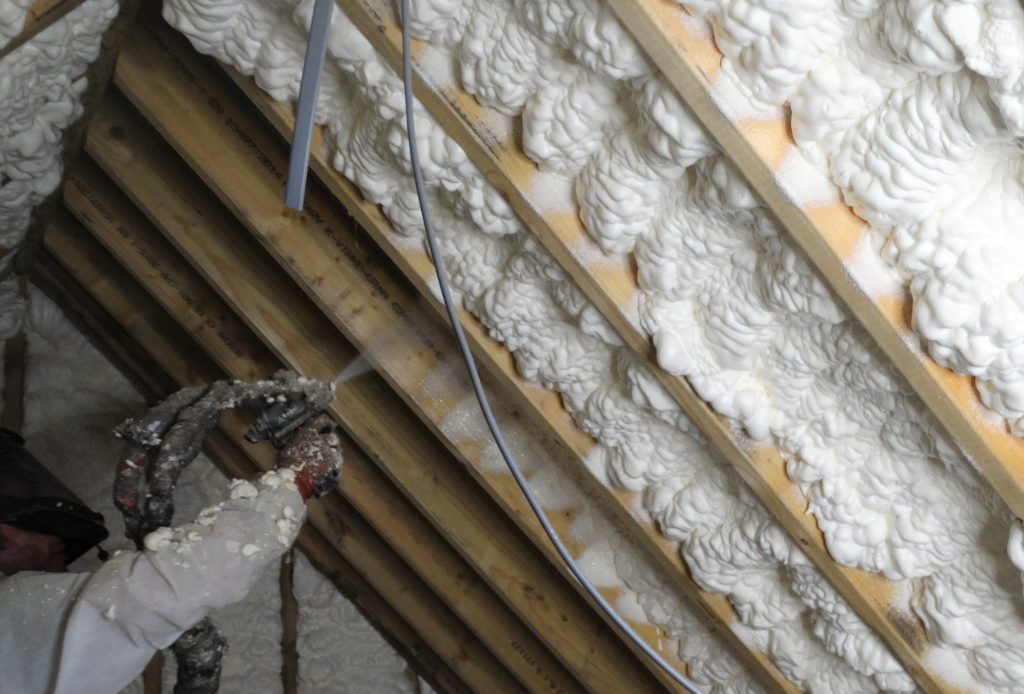Spray foam insulation pros and cons, including the advantages and disadvantages of alternative methods of insulation (inc. Fiberglass…
What is Icynene Spray Foam Insulation?
Icynene is the market leading spray foam insulation uk & Ireland and can be applied to both breathable and non-breathable roof membranes and felts. It fills every crack and crevice to eliminate air leakage or infiltration.
Icynene Insulation Pros and Cons

25 YEARS MANUFACTURER’S WARRANTY
BBA AND ENERGY SAVING TRUST APPROVED PRODUCT
PREVENTS HEAT LOSS
FIRE RETARDANT
DIY PROJECT
Pros
- 100% water blown. Icynene is 100% water blown and contains no harmful blowing agents. Therefore, making it eco-friendly. In addition, Icynene spray foam open cell contains no harmful chemicals.
- High Insulation Value. Icynene has a U-value of 0.039, which is in the same ballpark as fibreglass and alternative insulation products. However, unlike alternative insulations, Icynene spray foam maintains its shape and creates an ultimate air seal, preventing heat loss.
- Up to 50% Energy savings. Air leakage can contribute to up to 50% of a buildings energy loss, as a result an increase in energy bills. Therefore, with the use of Icynene energy bills can be sliced.
- Breathable insulation. Icynene LD-C-50 is 100% open cell allowing the timbers to breathe, hence, the timbers do not rot. This also prevents the chance of mould and condensation forming.
- Noise reductions. Icynene spray foam insulation minimises unwanted airborne sounds that can invade living spaces.
Cons
- Not a DIY project. Unfortunately, you cannot go to your local supply store and purchase the required appliances and get dug in. Applying Icynene requires licensed installers, which can be scarce.
- Spray foam insulation can be messy upon application. Therefore, it may be necessary for installers to sand areas down in order to smoothen out the surface. However, our installers ensure they cover the surrounding surface and clean up after completion.
- Not ideal for cavity walls. We use Technitherm closed cell for cavity wall insulation which is the market leading certified spray foam insulation suitable for new and existing cavity walls of all types.
How About Traditional Insulation?

Fibreglass Pros & Cons

INEXPENSIVE METHOD
FIT AND FORGET TECHNOLOGY
REDUCES HEAT LOSS
FIRE PROOF
EASY TO INSTALL, ELIGIBLE FOR DIY
Pros
- Inexpensive. Fiberglass insulation is perhaps the more inexpensive method of insulation whilst still being considerably effective.
- Shrinkage. Fiberglass does not shrink so surface area will not be reduced.
- Effective vapour barrier. Fiberglass insulation has an added protected plastic sheet on top of it that acts as an effective vapour barrier.
Cons
- Skin irritation. Installers must wear protective gear throughout the process of insulation due to the slivers released from the fibreglass. These slivers can easily be inhaled and caught in your skin.
- Harmful chemicals. Fibreglass contains formaldehyde which is highly toxic.
- Sagging. After time the insulation begins to sag causing the U-Value to decrease. Hence, causing the effectiveness of the insulation to dip along with it.
Cellulose Pros & Cons

INEXPENSIVE METHOD
SOUND PROOFING
PREVENTS HEAT LOSS
FLAMMABLE
DIY PROJECT
Pros
- Fire Retardant. Cellulose insulation is fire retardant due to the boric acid the material contains.
- Eco-friendly. Cellulose insulation is made from newspapers. Therefore, reducing the amount of newspaper being dumped into landfills.
- Longer U-value. An acrylic binder is added to cellulose thus reducing the U-value of the insulation from decreasing.
- Inexpensive Product. Cellulose insulation is possibly the cheapest of all the popular insulation methods due to it being made out of recycled card and paper.
Cons
- Sagging. Overtime cellulose sags, resulting in the U-value decreasing. Consequently, a decrease in performance.
- Flammable. Cellulose is coated with boric acid making it fire retardant, however, over time the coating can wear off and become flammable.
- Dust. During installation of cellulose a huge amount of dust is given off, causing potential respiratory distress.
- Installation cost. Installing Cellulose insulation into a property can be pricy in comparison to the actual purchase of the product.
- Moisture absorption. The efficiency of cellulose decreases due to the insulation absorbing moisture which can also cause moulding and rotting.
At Evergreen Power UK we take pride in providing outstanding services in order to make choosing the appropriate insulation for you, hassle-free. Our teams are all qualified with the use of Icynenes spray insulation, so they to provide you with professional advise and answer all questions you may have. In addition, we provide a 25-year manufacturer warranty guarantee with every installation.
If you still have doubts after evaluating the pros and cons of different insulation methods, feel free to contact us for more information. Or check out our customer review page for testimonials.






2 replies on “Icynene Insulation Pros and Cons – Justify your Decision”
Excellent content. Glad I got here. I like spray foam more than other forms of insulation.
Thank you Sir!